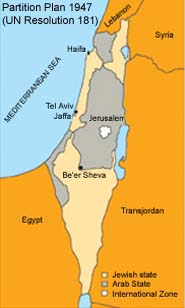
Seventy years ago, on November 29, 1947, the United Nations General Assembly passed Resolution 181, remembered as the UN Partition Plan. It called for creating two states in the then British Mandate of Palestine. The British had assumed administrative control over this area in the wake of the dissolution of the Ottoman Empire after World War I, and were now preparing to leave.
The plan devised eight areas, three assigned to an Arab state, and three to a Jewish state. A seventh area would be an Arab enclave within the Jewish territory; and the city of Jerusalem, the eighth area, a place considered holy to three religions, was to be governed by the UN Trusteeship Council. The two states were to be established within a year.
The plan was accepted by the Jewish Agency for Palestine, despite its limitations, such as discontiguous areas with borders that looked indefensible. Also, while the Arab areas were overwhelmingly populated by Arabs, the Jewish areas were only 55 percent Jewish. Many Zionist activists believed that once a Jewish state existed, its borders could be adjusted and expanded later on.
Arab leaders and governments rejected any form of territorial division as a violation of the principles of national self-determination in the UN Charter, which granted people the right to decide their own destiny. The Arabs, still a majority on the land, were profoundly disillusioned by what they saw as the cavalier UN proposal to partition the land in such a way as to grant vastly disproportional territory to the Jewish minority.
The UN in 1947 had 56 member states. A two-thirds majority was needed for the resolution to pass. Historians record a period of intense lobbying by Zionist interests to sway the vote, including a delay of the vote by three days to ensure the result.
The vote on Nov. 29th was 33 to 13; 10 countries abstained or were absent. Voting for were the US and Canada, most of Western Europe, seven countries of Latin America and the Caribbean (not Cuba, however), Czechoslovakia, Poland, the USSR , the Byelorussian SSR and Ukrainian SSR. The UK, Yugoslavia and (pre-Communist) China abstained. The only nations with a Muslim majority population (Turkey, Afghanistan, Iran, Iraq and Lebanon), along with India, voted against.
The UN voted conferred legitimacy to the Jewish nationalist project. The Soviet Bloc countries in the UN voted for Resolution 181, following Marxist precepts on “the national question.” On both the Jewish and the Arab side in Palestine, the Soviets expected, strong socialist ideas held sway, which might take sides with the USSR on the global stage. There clearly was also some feeling in Europe, both East and West, that after the Holocaust, which seemed to demonstrate that no country was particularly welcoming to Jews, this “nation” finally deserved to have their own territory.
Immediately after adoption of the Resolution by the General Assembly, a civil war broke out and the plan was not implemented. By 1949, within a year following Israel’s War of Independence, Israel was already one-third larger than the UN partition plan had envisioned.










